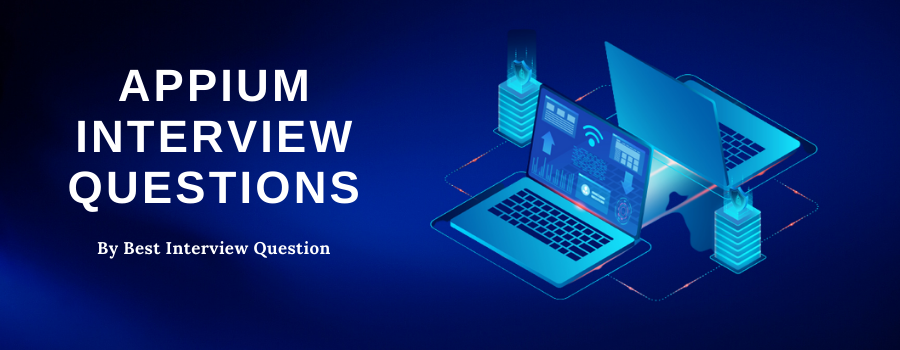Appium Interview Questions and Answers

Appium is an open-source tool for automating Quality Testing on native, mobile web, and cross-platform applications for iOS mobile, Android mobile, and Windows desktop platforms. More importantly, Appium is "cross-platform" which allows you to write Quality functioning tests against multiple platforms (iOS, Android, Windows) while using the same API. This enables code reuse between multiple platforms like iOS, Android, and Windows testsuites. Below is a list of the most commonly asked Appium Interview Questions. Have a read online or download in PDF format to read later on.
Advantages of Using Appium:
- Appium is free and easily downloadable from GitHub.
- Appium can be used to automate Native, Web, and Hybrid mobile applications and the tests can be executed on multiple Real Devices, Simulators, and Emulators.
- Appium is cross-platform, allowing code reusability, hence saving a lot of time
- Appium supports many programming languages.
Most Frequently Asked Appium Interview Questions
Here in this article, we will be listing frequently asked Appium Interview Questions and Answers with the belief that they will be helpful for you to gain higher marks. Also, to let you know that this article has been written under the guidance of industry professionals and covered all the current competencies.
Appium is an open-source Quality Testing Automation tool used for testing various mobile applications. It allows QA Analysts to test different types of mobile applications (like Native, Cross-Platform and Web Apps) using the standard WebDriver library. Through Appium, automated tests can be run on actual devices like tablets, mobile phones, etc
There are 10 different types of functional/unit testing. They are:
- Functional Testing
- Usability Testing
- Compatibility Testing
- Performance and Load Testing
- Installation Testing
- Security Testing
- Mobile-oriented Testing
- Automated Testing
- Manual Testing
- Localization Testing
Appium is written in Node.js which is basically a client-server architecture served as an HTTP server built to create and handle multiple WebDriver sessions. This testing tool starts as a “ Test Case” on the device which then spawns a server and listens to any proxy commands from the main server of Appium.

Once the Appium server receives a connection with details from the client in the form of a JSON object over HTTP, it creates a session as specified in JSON, and then returns the session ID, which is to be maintained until the main Appium server is running. Thus, all the quality testing will be performed in this newly created session. Following is a diagram depicting the Appium architecture clearly:
Challenges faced while Quality Testing may vary from application to application, but, these 8 challenges are the most common obstacles faced:
- Optimizing with User Experience & App Performance both in mind
- Touch screens make the process more intricate and complex
- Context Awareness and its limitation to functionalities
- Short Timeline
- Lack of Access to Multiple Devices
- Variations of Mobile Interfaces
- Device-Based Quality Testing
- Security Concerns
The following are the basic prerequisites for running Appium.
- You should have a Windows or Mac OS
- Install Java JDK version 7 and above
- Install Android SDK version 22 and above ( inbuilt with android studio )
- Setup Appium command server setup/ download and install Appium GUI .exe file
- Install Google USB Driver latest
Install IDE -eclipse/Intelligent/android studio
Below is a list of System Requirements for running Appium
Hardware:
- Intel® i5 or i7 processor.
- 1 GB free hard disk space.
- 8 GB RAM
- 1 available USB 2.0 port and USB cable.
Windows OS Requirements:
- Microsoft Windows XP SP2 (32 bit), Vista (32/64 bit), Windows 7 (32/64 bit), Windows 8 or above.
- Net Framework 3.5 or above
Mac OS and Software Requirements:
- OS X version 10.7 or higher.
- XCode and Command-Line Developer(CLD) Tools
The most difficult scenario to test on Appium is an environment with data exchange as it requires testing of varied modules with different device testing, making the process very complex
In Appium, Desired Capabilities are a set of keys and values sent to the main Appium Server to relay as to what kind of automation should be started. There are various capabilities that are used to modify the behavior of the server accordingly during the automation process.
UDID stands for Unique Device Identifier. It is required during the process of Android application development or also during Android App automation to get a unique ID of a specific Android device.
Here’s a list of steps to successfully find your device UDID
- Go to settings for your Mobile device- About Phone - Build Number -Tap 7 times to enable Developer options.
- Go to Developer options, under Debugging -> Make sure to enable USB debugging ON.
- Now connect your mobile device(using a USB cable) to your PC.
- Open Command Prompt and type below command
-> ADB devices - Note down the UDID of your device. It will appear as shown in below screenshot
In Appium, UI Automator is a User Interface testing framework best suited for cross-app functional UI testing across systems and other installed apps. The UI Automator APIs allow you to perform various operations such as opening the Settings menu or also opening the app launcher in a test device.
